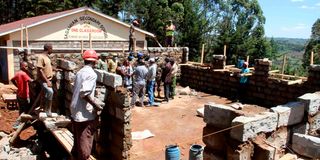MPs eye role in building school infrastructure, feeding learners

The construction of junior secondary classes at Sagamian High School in Narok County on January 10, 2022.
MPs are seeking greater control over an enhanced National Government Constituency Development Fund (NG-CDF) kitty by transferring money meant for expanding infrastructure in primary and secondary schools from the Ministry of Education to their offices.
The MPs also want to be included in the running of the school feeding programme, which is being implemented by the national and county governments. The proposals are contained in a report of the Budget Appropriations Committee that was tabled before the National Assembly on Tuesday.
If the recommendations are adopted, MPs and their constituency development committees will determine the schools to benefit from government funding, the amount and how it will be spent. This comes at a time when junior secondary schools (JSS), which are hosted in primary schools, are lacking essential infrastructure.
At the disposal of the politicians will be billions of shillings meant for expanding infrastructure in schools. Last year, Sh2.8 billion was allocated for infrastructure while Sh4.2 billion had been set aside the previous year.
Secondary schools also receive funds for infrastructure through the Free Day Secondary Education where each learner is allocated Sh5,000. According to ministry guidelines, the funds are banked in a separate account and are strictly used for infrastructure.
Bursaries disbursement
Through the NG-CDF kitty, MPs also control the disbursement of bursaries to learners at all levels of education, a process that is widely criticised as being subjective in the selection of beneficiaries.
The Kenya Kwanza manifesto had promised to double the allocation for the feeding programme to raise the number of beneficiaries from two million to four million and to provide conditional grants to county governments to extend the programme.
Currently, the programme is implemented in 26 counties. The BAC report has recommended a Sh628.6 billion allocation for the education sector in the 2023-24 Financial Year. Last year, the sector had an allocation of Sh544.4 billion. The current allocation translates to 27.1 per cent of the national budget which will be one of the highest in Africa.
It recommends that the government prioritises the clearance of tuition fees balance for students in private universities to reduce dropout cases. The government has stopped paying tuition for new students in private universities under the new funding model that will be adopted in September when first-year students report.
The MPs also recommend that the State Department for Basic Education table before the National Assembly a status report on the establishment of junior secondary schools and their staffing levels and infrastructure gaps.
The BAC report recommends that examination waivers be given to learners through capitation, unlike the current model where the government has allocated the same amount of money despite an increase in the number of candidates as well as extra assessments set by the Kenya National Examinations Council.
The Teachers Service Commission has the biggest allocation of Sh323.83 billion. The commission has been granted Sh1 billion for the promotion of teachers although it had requested Sh2.2 billion. It will also get Sh2.5 billion for the recruitment of teachers on permanent and pensionable terms and Sh4.8 billion for the hiring of 20,000 teachers on contract.





